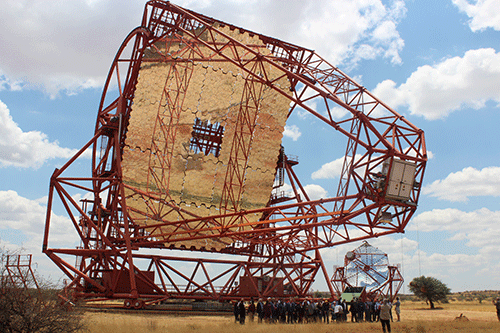German education ministry representative Ralph Dieter says borders should not limit scientific discoveries, and existing research partnerships with Namibia and other institutions is progress with great impact on international relations.
He said this during the 20th anniversary of the High Energy Stereoscopic System (HESS) research centre. The telescope is situated at Farm Goellschau, some 120km west of Windhoek on the C26. It is the largest instrument of its kind in the world. The project is a consortium between research partners of the University of Namibia.
HESS is one of the leading observatories studying very high-energy (VHE) gamma-ray astrophysics. Cosmic magnetic fields are extremely effective in shaping the universe, but are very difficult to track and measure, something which Namibia will be able to assist in when it comes to further research.
This instrument allows scientists to explore gamma-ray sources with intensities at a level of a few thousandths of the flux of the Crab nebula (the brightest steady source of gamma rays in the sky.
The HESS telescopes have been highly decorated by the European Commission in 2007 with the Descartes Prize for Excellence in Transnational Collaborative Research.
International relations’ minister Netumbo Nandi-Ndaitwah said in 2014, Cabinet approved the first National Programme on Research, Science, Technology and Innovation (2014–2017), which explicitly names Space Science and Astronomy as one of the national Key Research Areas, and the National Space Science Council was then established.
“This led not only to the awarding of a major share of the Square Kilometre Array (SKA) – one of the largest scientific endeavours in history – to South Africa and its African partners, including Namibia, but also to bilateral and multilateral agreements on the support of astronomy in 2014, and on Cooperation in Radio Astronomy in 2017,” said Nandi-Ndaitwah.
This opens unique prospects for astronomy in Namibia to conduct its investigations and reinforce its position in science.
She added: “Namibia has meanwhile adopted her Science, Technology and Innovation Policy 2020–2030vjust two months ago, which led to the adoption of the Windhoek Statement on Artificial Intelligence in Southern Africa 2022, and is currently setting up her National Fourth Industrial Revolution (4IR) Policy, which was informed by the Presidential Task Force Report.”
More than 200 scientists of 40 scientific institutes from 13 countries, including Namibia, are involved in the HESS project at Farm Goellschau. The funding of the project is done by Germany, France and other partners, including Namibia, South Africa, the UK, Ireland, Armenia, Poland, Australia, Austria, Sweden, Netherlands and Japan.
Nandi-Ndaitwah stated: “Namibia is a child of international solidarity. I appeal to the international community to continue to support Unam and Namibia’s endeavour on this pathway towards world-leading research in astronomy.”
- psiririka@nepc.com.na


